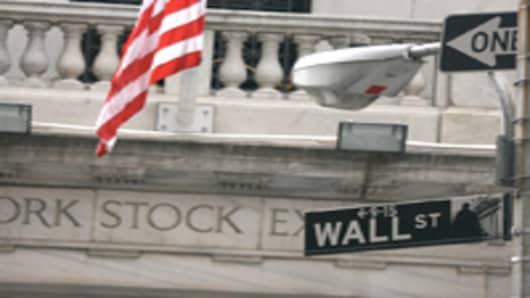Republican presidential candidate John McCainon Tuesday called for a high-level commission to study the current economic crisis and claimed that a corrupt and excessive Wall Street had betrayed American workers.
Reiterating his remarks at a town hall meeting Monday, McCain said on CNBC's Squawk Box he would like to see a 9/11-style commission take a close look at Wall Street.
"We need to catch up with oversight and regulation and transparency, but obviously, we don't want to burden average citizens with over-regulation and government bureaucracy," McCain said. "And I'm proud to be a Teddy Roosevelt Republican, who said, 'unfettered capitalism leads to corruption,' and we've got to fix this."
McCain also said he did not believe the federal government could continue bailing out failing companies, adding it was in the taxpayers' best interest to let faltering companies like insurance giant AIG fail than strap the American people with the bill.
"When you see these people who are the top executives, after really having failing enterprises, and not succeeding, leaving with these huge packages, that makes the American people cynical, and, frankly, it threatens the free enterprise system, and lends itself sometimes to over-regulation," he said.
McCain and Democratic contender Barack Obama both promised Monday to move quickly to reform Wall Street, with both blaming an antiquated regulatory structure for the financial meltdown.
As the Federal Reserve and U.S. Treasury grappled with the worst financial crisis since the Great Depression, Democratic presidential nominee Obama said policy-makers lacked the tools needed to contain the problems and were "making it up as they go along."
"Each problem ends up requiring a patchwork solution," Obama, said on his campaign plane as he traveled in Colorado.
On Tuesday, Obama's running mate, Sen. Joseph Biden, appeared on CNBC's Squawk Box, saying AIG is just one more example of flawed economic policies and fundamentals in the United States.
"The fundamentals in this economy have not been strong. You've got a trillion dollars in new debt to new governments. You're borrowing money from China to pay for Saudi oil. You're in a situation where we're left with a $400 billion debt this year. Why? Because of a war we're involved in in Iraq at $10 billion a month, and a tax policy where money's flying out the door on the top income earners."
Biden said he and Obama would fix the current financial crisis by stopping "the bleeding by the things that caused this to occur, number one. Number two, create jobs. Number three, try to keep people in their homes by changing the bankruptcy laws (and) make sure we have common sense regulation," Biden said. "If you want to come and borrow money from the Fed, that's another way of saying from the American taxpayer, then we get a chance to look into your books."
Differences of Approach
A top adviser to McCain said the Republican nominee believed a network of regulatory agencies should be combined and given broader powers to achieve transparency.
Related story:
"The Washington regulatory structure over Wall Street is about 70 years old now," said Carly Fiorina, senior economic adviser to the Arizona senator.
"He's been saying for some time and again today that this would be a top priority — that he will, in his administration, put an end to the abuses that we're seeing in both Washington and on Wall Street," Fiorina told Reuters in a telephone interview.
Obama has long urged a modernizing of the financial system. He called for it in a speech at NASDAQ a year ago and outlined a plan for an overhaul of Wall Street regulations in March.
McCain, whose economic message usually focuses more on his promise to keep taxes low and reduce government spending, put greater emphasis on Monday on the need for regulatory reform.
The Republican candidate joined Obama in saying it would be a high priority for his administration in the first year.
Fiorina, a former chief executive of computer giant Hewlett-Packard, said McCain would start working on Wall Street regulatory reform within the first 100 days of his presidency.
"There's a patchwork of various regulatory agencies, which means that no one sees the whole picture, and so he would consolidate and streamline those regulatory agencies and give them more authority and accountability to demand transparency from Wall Street," she said.
Obama said quick action was needed to shore up the shattered faith of investors.
"I think we have to move on it very quickly because my suspicion is the deteriorating confidence in the credit markets, in the financial markets, is not going to immediately bounce back," he said.
Biden said the Democratic presidential campaign's solutions for the economic crisis include giving middle-class taxpayers a substantial tax break, putting an end to Bush administration tax cuts that favor the wealthy, investing in infrastructure, and changing bankruptcy laws to help people facing foreclosure.
"The fundamentals in this economy have not been strong," Biden said. "You've got a trillion dollars in new debt to new governments. You're borrowing money from China to pay for Saudi oil. You're in a situation where we're left with a $400 billion debt this year. Why? Because of a war we're involved in in Iraq at $10 billion a month, and a tax policy where money's flying out the door on the top income earners."



